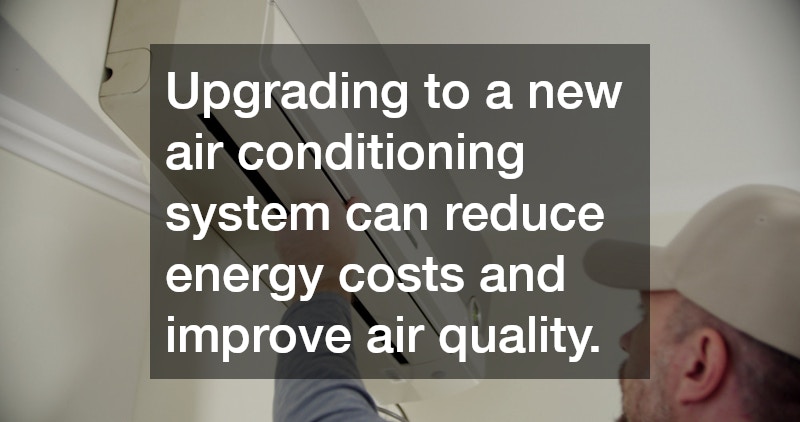When Is It Time to Replace Your Air Conditioning System?
Air conditioning is essential for comfort in Australian homes, especially during the hot summer months. Knowing when it’s time to replace your air conditioning system can save you money, improve energy efficiency and ensure your home stays cool when you need it most. Many homeowners wait too long before upgrading their system, which can lead to higher electricity bills and uncomfortable living conditions.
Understanding the signs that indicate a replacement is needed can help you make an informed decision. Whether your system is old, inefficient or frequently breaking down, recognising these warning signs early means you can avoid costly repairs and enjoy reliable cooling all year round.
Signs Your Air Conditioning System Needs Replacing
One of the most obvious signs that your air conditioning system is due for replacement is age. Most systems last between 10 and 15 years with regular maintenance. If your air conditioning unit is approaching or beyond this age range, it might be time to consider a new system.
Older air conditioners tend to lose efficiency over time, resulting in higher energy bills. Even if your unit is still functioning, it may be consuming more electricity than newer models designed with energy-saving technology. Upgrading to a modern air conditioning system can reduce your power consumption and lower your household expenses.
Another indication is frequent breakdowns or the need for regular repairs. If you find yourself calling out a technician often to fix your system, replacement may be more cost-effective than ongoing maintenance. Repair costs can add up quickly, sometimes exceeding the price of a new unit.
Poor cooling performance is also a warning sign. If your air conditioning no longer cools your home evenly or struggles to maintain your desired temperature, the system may be failing. This can be caused by worn-out components, refrigerant leaks or outdated technology that can’t keep up with your cooling needs.
Energy Efficiency and Environmental Considerations
Modern air conditioning systems are designed with energy efficiency in mind. Replacing an old, inefficient unit with a new energy-efficient model can significantly reduce your carbon footprint and electricity bills. Many new systems come with inverter technology, which adjusts the compressor speed to maintain consistent temperatures without wasting energy.
Replacing your air conditioning system also means you can take advantage of government rebates or incentives aimed at promoting energy-efficient appliances. Checking eligibility for such programs can offset the initial cost of a new system.
Considering the environmental impact of your cooling system is important. Older units may use refrigerants that are harmful to the environment, such as R22, which is being phased out in Australia. Newer air conditioners use eco-friendly refrigerants that comply with current regulations and contribute less to global warming.
When to Consult a Professional
Deciding when to replace your air conditioning system can be challenging. Consulting a qualified air conditioning technician is a smart step to assess your current unit’s condition and discuss your cooling needs. Professionals can perform a thorough inspection, including checking the compressor, evaporator coils and refrigerant levels.
A technician can also provide advice on the best replacement options tailored to your home size, insulation and budget. They will consider factors like energy efficiency ratings, system capacity and installation requirements.
Professional advice is particularly important if you are experiencing recurring issues, unusual noises or rising energy bills. Sometimes a simple repair or part replacement can extend your system’s life, but in other cases, replacement is the better option.
Benefits of Upgrading Your Air Conditioning System
Replacing an outdated air conditioning system offers many benefits beyond improved cooling. Newer units provide better air quality through advanced filtration systems that remove dust, allergens and pollutants. This is especially beneficial for households with children, elderly residents or those with respiratory conditions.
Upgraded air conditioners also tend to operate more quietly, reducing noise pollution inside your home. Smart technology integration is common in modern systems, allowing you to control temperature settings remotely via smartphone apps. This adds convenience and can help save energy by adjusting cooling only when needed.
Finally, a new air conditioning system adds value to your home. Energy-efficient and modern appliances are attractive to potential buyers and can increase your property’s market appeal.
Knowing when to replace your air conditioning system is key to maintaining a comfortable, energy-efficient home. If your unit is over 10 to 15 years old, frequently breaks down or struggles to cool your living space, it’s time to start exploring replacement options.
Upgrading to a new air conditioning system can reduce energy costs, improve air quality and provide more reliable performance during Australia’s hottest days. Consulting a qualified technician will help you make the best choice for your home and budget.
By acting at the right time, you ensure your home stays cool and comfortable without unnecessary expense or inconvenience. A well-maintained, modern air conditioning system is an investment in your household’s comfort and well-being for years to come.


